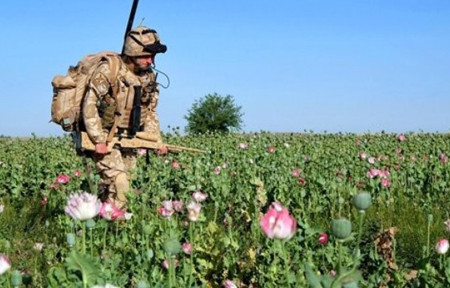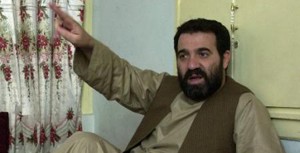By Tom Lassetter
KANDAHAR - When it's harvest time in the poppy fields of Kandahar, dust-covered Taliban fighters pull up on their motorbikes to collect a 10 percent tax on the crop. Afghan police arrive in Ford Ranger pickups -- bought with U.S. aid money -- and demand their cut of the cash in exchange for promises to skip the farms during annual eradication.

A British soldier in a poppy field in Maywand region of Kandahar. (Photo: AP)
Then, usually late one afternoon, a drug trafficker will roll up in his Toyota Land Cruiser with black-tinted windows and send a footman to pay the farmers in cash. The farmers never see the boss, but they suspect that he's a local power broker who has ties to the U.S.-backed Afghan government.
Everyone wants a piece of the action, said farmer Abdul Satar, a thin man with rough hands who tends about half an acre of poppy just south of Kandahar. "There is no one to complain to," he said, sitting in the shade of an orange tree. "Most of the government officials are involved."
Afghanistan produces more than 90 percent of the world's opium, which was worth some $3.4 billion to Afghan exporters last year. For a cut of that, Afghan officials open their highways to opium and heroin trafficking, allow public land to be used for growing opium poppies and protect drug dealers.
The drug trade funnels hundreds of millions of dollars each year to drug barons and the resurgent Taliban, the militant Islamist group that's killed an estimated 450 American troops in Afghanistan since 2001 and seeks to overthrow the fledgling democracy here.

The Times, November 24, 2007: "President Karzai's half-brother Wali, head of Kandahar's provincial council, continues to be accused by senior government sources, as well as foreign analysts and officials, as having a key role in orchestrating the movement of heroin from Kandahar eastward through Helmand and out across the Iranian border."
The Globe and Mail, May.3, 2008: The man considered by many observers to be the most powerful and feared figure in the Afghan south is not the Kandahar governor but rather Ahmed Wali Karzai, appointed by his brother, President Hamid Karzai, to represent Kandahar province in Kabul. A government document leaked to ABC News two years ago accused him of being the central figure in the region's vast opium-export market, which produces the majority of the world's opium and heroin.
New York Times, October 5, 2008: Numerous reports link Ahmed Wali Karzai to the drug trade, according to current and former officials from the White House, the State Department and the United States Embassy in Afghanistan, who would speak only on the condition of anonymity.
What's more, Afghan officials' involvement in the drug trade suggests that American tax dollars are supporting the corrupt officials who protect the Taliban's efforts to raise money from the drug trade, money the militants use to buy weapons that kill U.S. soldiers.
To unravel the ties among militants, opium and the government, McClatchy interviewed more than two dozen current and past Afghan officials, poppy farmers and others familiar with the drug trade. Seven former Afghan governors and security commanders said they had firsthand knowledge of local or national officials who were transporting or selling drugs or protecting those who did.
Most of the sources feared retribution. One man was killed a week after he spoke to McClatchy. Another called back a week after the interview and said he hadn't left his home in days, fearful that McClatchy's calls to verify his story would bring trouble. A third met on the condition that a reporter promised not to tell anyone where he lives.
"In this country, if someone really tells the truth he will have no place to live," said Agha Saqeb, who served as the provincial police chief in Kandahar, in the heart of Afghanistan's opium belt, from 2007 to 2008. Naming Afghan officials who profit from drugs, he said, would get him killed: "They are still in power and they could harm me."
The embassies of the U.S., Britain and Canada -- the countries principally behind counter-narcotics in Afghanistan -- declined to comment. A State Department report issued earlier this year flatly noted that: "Many Afghan government officials are believed to profit from the drug trade."
The corruption allegedly reaches the highest levels of Afghanistan's political elite. According to multiple Afghan former officials, Ahmed Wali Karzai, the brother of President Hamid Karzai and the head of the provincial council in Kandahar, routinely manipulates judicial and police officials to facilitate shipments of opium and heroin.
Ahmed Wali Karzai and his defenders retort that the U.S. government never has formally accused him of any wrongdoing.
Ahmed Wali Karzai himself is defensive, saying that the accusations are part of a political conspiracy against his brother, the president. When he was asked recently about the allegations linking him to drugs and crime, he threatened to assault a visiting McClatchy reporter.
Allegations
The narcotics trade in Afghanistan would be impossible without government officials and the Taliban on the payroll, said the man in the brown turban. "The link between them is a natural one."
The man should know. He's a drug dealer in Kandahar who provides money to purchase opium culled from poppy on local farms and arranges for it to be shipped to markets near the city.
"The drug smuggler tells a police commander to transport a certain amount of drugs, for example, from the city to Maiwand District" -- on the northwest edge of Kandahar province --"and pays him 100,000 Pakistani rupees," about $1,200, said the dealer, who asked that his name not be used for fear of running afoul of local warlords or officials. "And then from Maiwand, he pays the Taliban another 100,000 rupees to take it farther," to heroin labs in the southern province of Helmand and on to Pakistan or Iran.
The dealer offered introductions to the Taliban or to the provincial governor, but there was one man he didn't wish to discuss: Ahmed Wali Karzai.
According to several Afghan former officials in the region, the major drug traffickers in southern Afghanistan don't worry much about getting caught because they're working under the protection of Karzai and other powerful government officials.
For example, a former top Afghan intelligence official recounted an incident from about five years ago, when, he said, his men arrested a Taliban commander who was involved with drugs at a key narcotics-trafficking point between Helmand and the Pakistani border.
Late on the evening of the arrest, a local prosecutor dropped by and said that Ahmed Wali Karzai wanted the militant released, according to Dad Mohammed Khan, who was the national intelligence directorate chief of Helmand province for about three years before he became a member of the national parliament.
Khan said he released the Taliban commander, a man known as Haji Abdul Rahim, because he didn't want to tangle with the president's brother.
A week after his conversation with McClatchy, Khan -- who had a reputation for dealing with enemies ruthlessly -- was killed by a roadside bomb that most attribute to the Taliban.
Asked for comment about Dad Mohammed Khan's allegation and others during an interview at his palatial Kandahar home, which is protected by guard shacks, perimeter walls and sand-filled roadblocks, Ahmed Wali Karzai said he had nothing to do with drugs.
A few minutes later, he yelled, "Get the (expletive) out before I kick your (expletive)" at a reporter.



